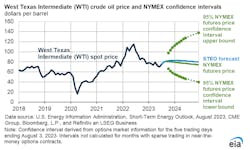EIA: U.S. to set crude oil production record this year
The U.S. Energy Information Administration (EIA) predicts U.S. crude oil production will surpass 12.9 million barrels per day for the first time later this year—and exceed 13 million barrels per day early next year.
In its August Short-Term Energy Outlook (STEO), EIA forecasts U.S. crude oil production to average 12.8 million barrels per day in 2023, which is 200,000 barrels per day more than in its July forecast.
EIA expects sustained global demand for petroleum products and Saudi Arabia’s extended voluntary production cuts will contribute to oil prices rising through the year. The Brent crude oil price was near $75 per barrel at the beginning of July and increased throughout the month to surpass $86 per barrel on August 4. EIA forecasts the Brent crude oil price to increase the rest of 2023 and approach $90 per barrel in late 2023.
“We forecast continued growth in domestic oil production, which is bolstered by higher oil prices and higher well productivity in the near term,” EIA Administrator Joe DeCarolis said in a news release.
EIA forecasts U.S. regular gasoline prices will average about $3.63 per gallon for the rest of 2023, an increase from its previous forecast of $3.27 per gallon. Higher gasoline prices are largely the result of higher crude oil prices and a series of unplanned U.S. refinery outages so far this summer.
Also in the August STEO, EIA expects that July’s high temperatures and resulting demand for air conditioning led to near-record levels of electricity consumption. EIA estimates about 388 billion kilowatt-hours of electricity was consumed in the country during July, roughly equal to the record for monthly U.S. consumption set in August 2022.
“Most of the country felt some brutal heat in July, and just like last summer, that heat significantly increased electricity consumption,” DeCarolis concluded.

